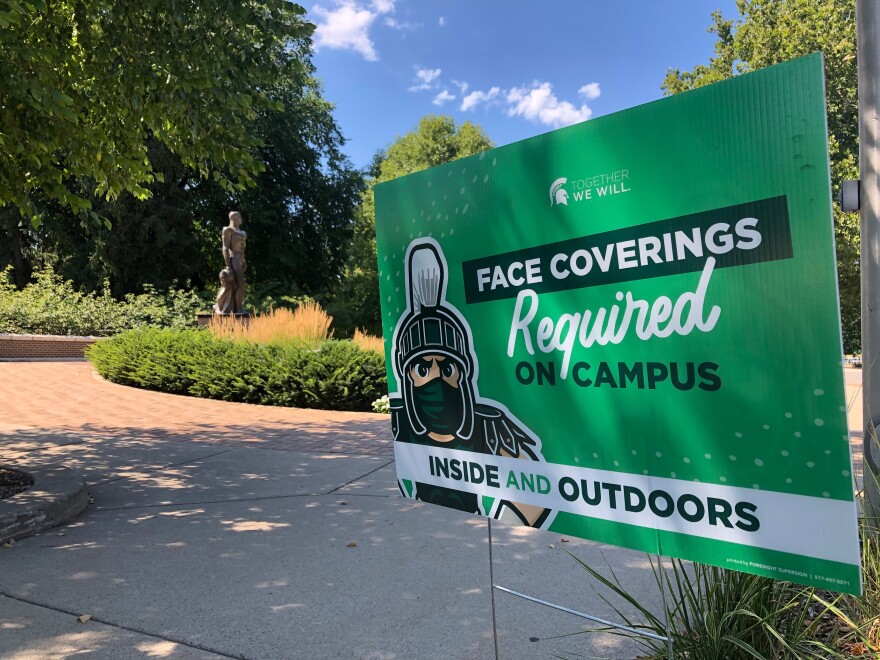Michigan State University is no longer alerting faculty about certain cases of possible COVID-19 exposure in classrooms.
Instructors will no longer receive notifications from the Office of the Provost about “informal contacts," MSU Provost Teresa K. Woodruff said in a message sent Wednesday.
As opposed to a close contact, which is when an individual is within six feet of someone for at least 15 minutes, an informal contact could be any type of potential exposure to someone positive for COVID-19 outside of those parameters, MSU spokesperson Dan Olsen said.
MSU officials cited the university's high vaccination rate, mask mandate and other safety precautions, and contact tracing among its reasons for the decision.
“As you are aware, research has demonstrated that in-person teaching does not increase COVID-19 transmissions in a community, that it is important to students’ learning as well as to their mental and emotional health, and to providing equitable educational opportunities,” Woodruff said in the message.
Before the university launched its COVID-19 Dashboard last week, MSU leaders believed alerting faculty of any possible exposure would be helpful, according to Olsen.
The dashboard includes self-reported vaccination figures along with weekly testing and case totals.
“However later, as the semester went on, it became apparent that these notifications were more confusing to the people receiving them as well as our campus community,” Olsen said.
The school said MSU’s COVID-19 Triage Team or the Ingham County Health Department will continue to notify anyone who meets the criteria for being a confirmed close contact.
Several MSU faculty members took to social media to express disappointment with the policy change. They say the move lacks transparency and puts instructors in danger.
Erica Starr is a writing instructor at MSU and is also a member of the Union of Non-Tenure Track Faculty at Michigan State (UNTF).
Though she praised the school’s mask and vaccine mandates, Starr said she is frustrated by a lack of transparency since face-to-face teaching resumed.
“The way that's rolled out so far, has been really frustrating," she said. "Because it's not really clear, you know, where the numbers we're getting shown are coming from, and what sorts of contingency plans are in place. You know, what those numbers mean, what's going to happen next.”
Starr says that feeling is echoed among many colleagues.
“From what I've seen on Twitter, from other instructors and also on my department's listserv from other faculty members, [we're] feeling incredibly unprepared and unsure of what this means for us when we're going into the classroom," she said.
Ingham County, where MSU is located, is considered an area of high COVID-19 transmission by the county health department.
As of Wednesday, the school’s COVID-19 Dashboard confirmed 202 infections since the beginning of August through its early detection program.
The dashboard's data comes from mandatory and voluntary saliva testing, as well as people self-reporting through the COVID-19 triage phone line.
Olsen said MSU did not have one set threshold that would need to be met for the school to consider transitioning to remote learning. He said a number of factors like guidance from the Centers for Disease Control and Prevention and transmission numbers are constantly being looked at.
Olsen also stressed that research from the CDC found in-person teaching does not increase COVID-19 transmission referring to MSU as an "in-person university.”
“And we know that, you know, our students greatly missed out over the last few years on that in-person experience, which did impact them," Olsen said. "We know that in-person experiences for them contributes to the benefit of their mental and emotional well-being, and we're continuing to try to make those opportunities available to them for the remainder of the semester.”
Starr said she wants people to realize that the faculty at MSU are a diverse group of individuals, including parents who are unable to vaccinate their children and people who are immunocompromised.
“We didn't sign up to die for our jobs," she said. "And as much as we may love teaching, we may love our jobs. I know that I do. I also don't think that it is worth putting myself and my family and my community at risk to be teaching in-person, especially when it is for a university that seems to not really be making decisions with the community in mind.”

